 W
WZionism is both an ideology and nationalist movement among the Jewish people that espouses the re-establishment of and support for a Jewish state centered in the area roughly corresponding to Canaan, the Holy Land, or the region of Palestine. Modern Zionism emerged in the late 19th century in Central and Eastern Europe as a national revival movement, both in reaction to newer waves of antisemitism and as a response to Haskalah, or Jewish Enlightenment. Soon after this, most leaders of the movement associated the main goal with creating the desired state in Palestine, then an area controlled by the Ottoman Empire.
 W
WAliyah is the immigration of Jews from the diaspora to the Land of Israel historically, which today includes the modern State of Israel. Also defined as "the act of going up"—that is, towards Jerusalem—"making aliyah" by moving to the Land of Israel is one of the most basic tenets of Zionism. The opposite action, emigration from the "Land of Israel", is referred to in Hebrew as yerida ("descent"). The State of Israel's Law of Return gives Jews, their children, and their grandchildren automatic rights regarding residency and Israeli citizenship.
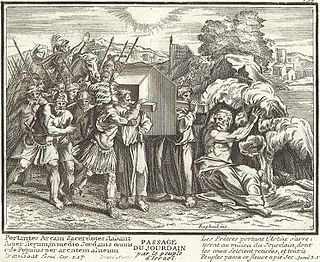 W
WYom HaAliyah, or Aliyah Day, is an Israeli national holiday celebrated annually according to the Jewish calendar on the tenth of the Hebrew month of Nisan to commemorate the Jewish people entering the Land of Israel as written in the Hebrew Bible, which happened on the tenth of the Hebrew month of Nisan. The holiday was also established to acknowledge Aliyah, immigration to the Jewish state, as a core value of the State of Israel, and honor the ongoing contributions of Olim, Jewish immigrants, to Israeli society. Yom HaAliyah is also observed in Israeli schools on the seventh of the Hebrew month of Cheshvan.
 W
WThe Alliance for New Zionist Vision is a coalition of grassroots educational and activist movements that ran in the 2015 American Zionist Movement elections for the 37th World Zionist Congress with the stated goals of making Zionism relevant to Jewish young adults, improving pro-Israel advocacy on North American university campuses, identifying the next major goals of Jewish history and giving a voice at the official Zionist movement to young activists on the front lines of Jewish social and political struggles. The ANZV was the only slate in the 2015 WZC elections exclusively running young adult candidates with activist backgrounds. The alliance comprises LAVI, Kumah and Doreinu.
 W
WAm Yisrael Foundation is a Tel Aviv and New York-based foundation and umbrella nonprofit organization for a variety of initiatives that promote Zionist engagement among Jewish young adults residing in Israel, including providing leadership platforms for young Jews who have made Aliyah, or are contemplating immigration to Israel.
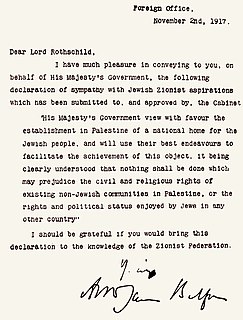 W
WThe Balfour Declaration was a public statement issued by the British government in 1917 during the First World War announcing support for the establishment of a "national home for the Jewish people" in Palestine, then an Ottoman region with a small minority Jewish population. The declaration was contained in a letter dated 2 November 1917 from the United Kingdom's Foreign Secretary Arthur Balfour to Lord Rothschild, a leader of the British Jewish community, for transmission to the Zionist Federation of Great Britain and Ireland. The text of the declaration was published in the press on 9 November 1917.
 W
WThe Battalion for the Defence of the Language was a small but militant body established by Jewish students at the Herzliya Hebrew Gymnasium in Tel Aviv, Israel in the 1920s to urge Jews to use only the Hebrew language.
 W
WThe Cambon letter was an unpublished letter to Zionist diplomat Nahum Sokolow issued by the French government in 1917 during the First World War announcing support for the Zionist project in Palestine, then an Ottoman region with a small minority Jewish population. It read: You were good enough to present the project to which you are devoting your efforts, which has for its object the development of Jewish colonization in Palestine.You consider that, circumstances permitting, and the independence of the Holy Places being safeguarded on the other hand, it would be a deed of justice and of reparation to assist, by the protection of the Allied Powers, in the renaissance of the Jewish nationality in that Land from which the people of Israel were exiled so many centuries ago. The French Government, which entered this present war to defend a people wrongfully attacked, and which continues the struggle to assure the victory of right over might, can but feel sympathy for your cause, the triumph of which is bound up with that of the Allies. I am happy to give you herewith such assurance.
 W
WCanaanism was a cultural and ideological movement founded in 1939 that reached its peak in the 1940s among the Jews of Mandatory Palestine. It has had significant effect on the course of Israeli art, literature and spiritual and political thought. Its adherents were called Canaanites. The movement's original name was the Council for the Coalition of Hebrew Youth ; "Canaanism" was originally a pejorative term. It grew out of Revisionist Zionism and according to Ron Kuzar had "its early roots in European extreme right-wing movements, notably Italian fascism". Most of its members were part of the Irgun or Lehi.
 W
WCentral Zionist Archives is the official archive of the institutions of the Zionist Movement: the World Zionist Organization, the Jewish Agency, the Jewish National Fund, and Keren Hayesod/the United Israel Appeal as well as the archives of the World Jewish Congress. The archive is located in West Jerusalem adjacent to Binyanei HaUma.
 W
WDaniel Deronda is a novel written by Mary Ann Evans under the pen name of George Eliot, first published in 1876. It was the last novel she completed and the only one set in the Victorian society of her day. The work's mixture of social satire and moral searching, along with its sympathetic rendering of Jewish proto-Zionist ideas, has made it the controversial final statement of one of the most renowned Victorian novelists.
 W
WThe East of the Jordan is a poem written by Ze'ev Jabotinsky, the Revisionist Zionist leader, a song that became one of the most known leading songs of the Revisionist Zionist youth movement, Betar. The song includes four Stanzas. Each stanza ends with the following line which is the main political message and theme of the poem:"Two Banks has the Jordan – This is ours and, that is as well."
 W
WJames Finn (1806–1872) was a British Consul in Jerusalem, in the then Ottoman Empire (1846–1863). He arrived in 1845 with his wife Elizabeth Anne Finn. Finn was a devout Christian, who belonged to the London Society for Promoting Christianity Amongst the Jews, but who did not engage in missionary work during his years in Jerusalem.
 W
WMiroslav Šalom Freiberger was a Croatian chief rabbi, catechist, translator, writer and spiritual leader. He was educated as a lawyer and doctor of theology.
 W
WThe Haavara Agreement was an agreement between Nazi Germany and Zionist German Jews signed on 25 August 1933. The agreement was finalized after three months of talks by the Zionist Federation of Germany, the Anglo-Palestine Bank and the economic authorities of Nazi Germany. It was a major factor in making possible the migration of approximately 60,000 German Jews to Palestine in 1933–1939.
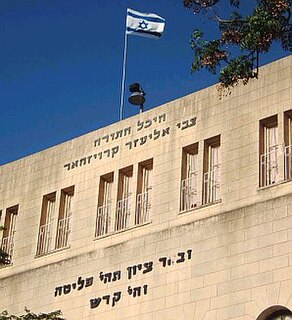 W
WFrom the founding of political Zionism in the 1890s, Haredi Jewish leaders voiced objections to its secular orientation, and before the establishment of the State of Israel, the vast majority of Haredi Jews were opposed to Zionism. This was chiefly due to the concern that secular nationalism would replace the Jewish faith and the observance of religion, and the view that it was forbidden for the Jews to re-constitute Jewish rule in the Land of Israel before the arrival of the Messiah. Those rabbis who did support Jewish resettlement in Palestine in the late 19th century had no intention to conquer Palestine and declare its independence from the rule of the Ottoman Turks, and some preferred that only observant Jews be allowed to settle there.
 W
WHerzl Day is an Israeli national holiday celebrated annually on the tenth of the Hebrew month of Iyar, to commemorate the life and vision of Zionist leader Theodor Herzl.
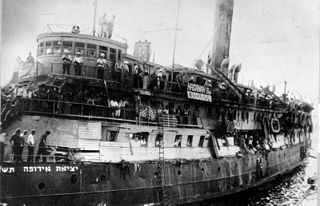 W
WA homeland for the Jewish people is an idea rooted in Jewish culture and religion. In the early 19th century, the Napoleonic Wars led to the idea of Jewish emancipation. This unleashed a number of religious and secular cultural streams and political philosophies among the Jews in Europe, covering everything from Marxism to Chassidism. Among these movements was Zionism as promoted by Theodor Herzl. In the late 19th century, Herzl set out his vision of a Jewish state and homeland for the Jewish people in his book Der Judenstaat. Herzl was later hailed by the Zionist political parties as the founding father of the State of Israel.
 W
WThe intercommunal conflict in Mandatory Palestine was the civil, political and armed struggle between Palestinian Arabs and Jewish Yishuv during the British rule in Mandatory Palestine, beginning from the violent spillover of the Franco-Syrian War in 1920 and until the onset of the 1948 Arab–Israeli War.
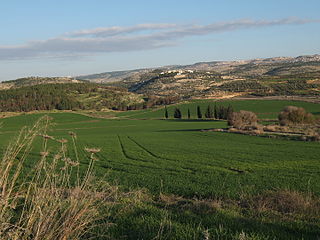 W
WThe Land of Israel is the traditional Jewish name for an area of indefinite geographical extension in the Southern Levant. Related biblical, religious and historical English terms include the Land of Canaan, the Promised Land, the Holy Land, and Palestine. The definitions of the limits of this territory vary between passages in the Hebrew Bible, with specific mentions in Genesis 15, Exodus 23, Numbers 34 and Ezekiel 47. Nine times elsewhere in the Bible, the settled land is referred as "from Dan to Beersheba", and three times it is referred as "from the entrance of Hamath unto the brook of Egypt".
 W
WIsraeli citizenship law regulates who are and can become citizens of Israel.
 W
WThe Israeli–Palestinian conflict is the ongoing struggle between Israelis and Palestinians that began in the mid-20th century amidst the greater Arab–Israeli conflict. Various attempts have been made to resolve the conflict as part of the Israeli–Palestinian peace process. It has been referred to as the world's "most intractable conflict," with the ongoing Israeli occupation of the West Bank and the Gaza Strip reaching 54 years.
 W
WJabotinsky Day is an Israeli national holiday celebrated annually on the twenty ninth of the Hebrew month of Tammuz, to commemorate the life and vision of Zionist leader Ze'ev Jabotinsky.
 W
WLebanese Jewish Migration to Israel included thousands of Jews, who moved to Israel, similar to how 1948 witnessed the emigration of hundreds of thousands of Jews from Arab countries. Yet, "unlike Jewish communities in many other Arab states, the Jewish communities in Lebanon grew after 1948 and it was not until the end of the civil war of 1975 that the community started to emigrate." This "Lebanese difference" derives from two components: more positive Lebanese relationships with European authorities during the French Mandate than experienced by other Arab states, leading to a more pluralistic outlook in Lebanon than its neighbors; some elements in the Maronite Christian community who were tolerant of Zionism.
 W
WJudaization of Jerusalem is the view that Israel has sought to transform the physical and demographic landscape of Jerusalem to enhance its Jewish character at the expense of its Muslim and Christian ones. This also often involves the increasing Jewish presence in Jerusalem in the modern era, referring to the Jewish Old Yishuv becoming increasingly dominant since the Ottoman era; this process continued until it became the largest ethno-religious group in Jerusalem since the mid-19th century and until the 1948 War, when Jordan cleansed Eastern Jerusalem from its Jewish presence.
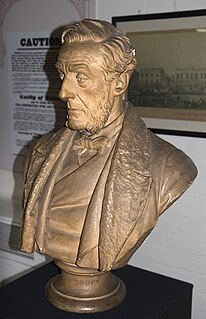 W
W"A land without a people for a people without a land" is a widely cited phrase associated with the movement to establish a Jewish homeland in Palestine during the 19th and 20th centuries.
 W
WThe Law of Return is an Israeli law, passed on 5 July 1950, which gives Jews the right to come and live in Israel and to gain Israeli citizenship. Section 1 of the Law of Return declares:"every Jew has the right to come to this country as an oleh [immigrant]."
 W
WA number of states and individuals have questioned the legitimacy of the State of Israel, specifically, whether Israel's political authority over the area it claims should be accepted as legitimate political authority. The argument as to the legitimacy of the State of Israel is also couched in terms of Israel's right to exist.
 W
WThe Megaphone desktop tool was a Windows "action alert" tool developed by Give Israel Your United Support (GIYUS) and distributed by World Union of Jewish Students, World Jewish Congress, The Jewish Agency for Israel, World Zionist Organization, StandWithUs, Hasbara fellowships, HonestReporting, and other pro-Israel public relations organizations. The tool was released in July during the 2006 Lebanon War. By June 2011, the tool was no longer available through the GIYUS website. An RSS newsfeed is available.
 W
WMikveh Israel is a youth village and boarding school in the Tel Aviv District of central Israel, established in 1870. It was the first Jewish agricultural school in what is now Israel and indeed the first modern Jewish settlement in Palestine outside of Jerusalem, heralding a new era in the history of the region.
 W
WMuscular Judaism is a term coined by Max Nordau in his speech at the Second Zionist Congress held in Basel on August 28, 1898. In his speech, he spoke about the need to design the "new Jew" and reject the "old Jew", with the mental and physical strength to achieve the goals of Zionism. Nordau saw Muscular Judaism as an answer to Judennot.
 W
WThe negation of the Diaspora is a central assumption in many currents of Zionism. The concept encourages the dedication to Zionism and it is used to justify the denial of the feasibility of Jewish emancipation in the Diaspora. Life in the Diaspora would either lead to discrimination and persecution or to national decadence and assimilation. A more moderate formulation says that the Jews as a people have no future without a "spiritual center" in the Land of Israel.
 W
WNietzschean Zionism was a movement arising from the influence that the German philosopher Friedrich Nietzsche had on Zionism and several of its influential thinkers. Zionism was the movement for the attainment of freedom for the Jewish people through the establishment of a Jewish state. Friedrich Nietzsche's philosophy was popular among Jewish intellectuals, incorporated into Zionism effortlessly. Friedrich Nietzsche's influence was exigent on moving away from the Jewish past into an empowering future for the Hebraic New Man, the adoption of his ideas necessitating the Jews to surpass the antiquarian Jewish identity that had a rabbinical consciousness at its center. The philosopher's influence on the Zionists can then be thought of as an existential revolution–that is, it focused on the renewal of the Jewish identity, the adoption of aesthetic values, and enhancing the will for life. Hence, the Zionists did not want to reconcile Friedrich Nietzsche with Zionism; but instead, his texts played a vital role in understanding and embracing the Jewish experience. The Zionist revolution emphasized that “the new Jews," the concept of which was similar to Nietzsche's “new European man,” should choose to go to Zion or to stay in Europe. More importantly, Theodor Herzl, “the author and the vision of the Jewish State,” viewed Zionism as the arrival of an authentic image of the Jew in a state without the idea of God or any dogmatization, exhibiting a very similar format to that of Nietzsche's libertarianism or anti-dogmatism.
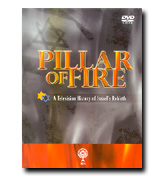 W
WPillar of Fire is a documentary television series of the Israel Broadcasting Authority (IBA), named after the Pillar of Fire, the biblical phenomena which led the ancient Israelites to the Promised Land during their exodus from Egypt. It was produced by Yaakov Eisenmann and edited by Yigal Loussin and presents the History and narrative of Zionism from the late 19th century until the establishment of the state of Israel in 1948. It first aired during the winter and spring of 1981 on Israeli Channel 1 over a period of five months, and attracted its biggest rating at the time. It was later broadcast on CUNY TV in the United States in 1988 in English narrated by Ian McKellen and it was announced by the German Minister of State to be aired as part of wide array of events to mark Israel's 60th Independence Day. It is still being re-aired at times, on the Israeli History Channel through the Israeli cable TV and satellite television providers, Hot and yes. In 2008, IBA has begun uploading the Pillar of Fire episodes to its official website in honor of Israel's 60th Independence Day, and in the same year The complete series was released to DVD and in English.
 W
WThe status of Jerusalem is disputed in both international law and diplomatic practice, with both the Israelis and Palestinians claiming Jerusalem as their capital city. The dispute has been described as "one of the most intractable issues in the Israel–Palestine conflict", with conflicting claims to sovereignty over the city or parts of it, and access to its holy sites. The main dispute revolves around the legal status of East Jerusalem and especially the Old City of Jerusalem, while broader agreement exists regarding future Israeli presence in West Jerusalem in accordance with Israel's internationally recognised borders. The majority of United Nations (UN) member states hold the view that the final status of Jerusalem should be resolved through negotiation, and have therefore favored locating their embassies in Tel Aviv prior to a final status agreement. However, in the late 2010s, the international consensus to abstain from expressing a viewpoint on the city's final status has shown signs of fragility, with Russia, the United States, and Australia adopting new policy positions. Furthermore, the proposal that Jerusalem should be the future capital of both Israel and Palestine has also gained international support, with endorsements coming from both the United Nations and the European Union.
 W
WIn Israel, a prisoner of Zion is a Jew who was imprisoned or deported for Zionist activity in a country where such activity was prohibited. The phrase is taken from words of Rabbi Judah Halevi: "Oh Zion, will you not ask after the welfare of your prisoners." The former Speaker of the Knesset, Yuli Edelstein, and the former Chairman of the Executive of the Jewish Agency, Nathan Sharansky, were both prisoners of Zion in the Soviet Union.
 W
WThe Promised Land is the land which, according to the Tanakh, God promised and subsequently gave to Abraham and to his descendants. In modern contexts the phrase "Promised Land" expresses an image and idea related both to the restored Homeland for the Jewish people and to salvation and liberation.
 W
WProto-Zionism is a term attributed to the ideas of a group of men deeply affected by the idea of modern nationalism spread in Europe in the 19th century as they sought to establish a Jewish homeland in the Land of Israel. The central activity of these men was between the years 1860 to 1874, before the Zionist movement established practical (1881) and political Zionism (1896). It is for this reason that they are called precursors of Zionism, or proto-Zionists.
 W
WYitzhak Rabin Memorial Day is an Israeli day of remembrance observed annually on the twelfth of the Hebrew month of Cheshvan, to commemorate the life of Zionist leader and Israeli Prime Minister and Defense Minister, Yitzhak Rabin, and his assassination.
 W
WThe Recording of the Israel Declaration of Independence was a complete recording of the declaration using a direct to disc recording technique on acetate discs using special cutting machines. Neither the original records nor their duplicates were demanded by Israel state authorities and to date they cannot be located, except for one original acetate disc. However, copies of the recording itself survived on different media.
 W
WThe San Remo conference was an international meeting of the post-World War I Allied Supreme Council as an outgrowth of the Paris Peace Conference, held at Villa Devachan in Sanremo, Italy, from 19 to 26 April 1920. The San Remo Resolution passed on 25 April 1920 determined the allocation of Class "A" League of Nations mandates for the administration of three then-undefined Ottoman territories in the Middle East: "Palestine", "Syria" and "Mesopotamia". The boundaries of the three territories were "to be determined [at a later date] by the Principal Allied Powers", leaving the status of outlying areas such as Zor and Transjordan unclear.
 W
WThis is a partial timeline of Zionism in the modern era, since the start of the 16th century.
 W
WThe principal common goal of Zionism was to establish a homeland for the Jewish people. Zionism was produced by various philosophers representing different approaches concerning the objective and path that Zionism should follow.
 W
WYishuv, Ha-Yishuv, or Ha-Yishuv Ha-Ivri is the body of Jewish residents in the Land of Israel prior to the establishment of the State of Israel in 1948. The term came into use in the 1880s, when there were about 25,000 Jews living across the Land of Israel and continued to be used until 1948, by which time there were some 630,000 Jews there. The term is still in use to denote the pre-1948 Jewish residents in the Land of Israel.
 W
WZion is a placename in the Hebrew Bible used as a synonym for Jerusalem as well as for the Land of Israel as a whole.
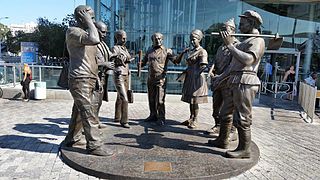 W
WThe Zionist Journey is a collection of seven bronze sculptures. Initially located in front of the Azrieli Center in Tel Aviv, Israel, in 2015 it was relocated to the Azrieli mall in Haifa. It represents a period Israel's development since the 1920s. It was created by the sculptor Henry Betzalel, initiated by David Azrieli.
 W
WZionist political violence refers to acts of violence or terror committed by Zionists. The most active period of most notable Zionist political violence began on June 30, 1924, and continued on a sporadic basis until the late 1940s.